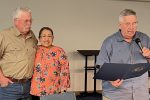Behind the Scenes of Caldwell County’s Sara Love, Veteran Services Officer
Caldwell County
Caldwell County doesn’t just run on its own. There are many folks who work behind the scenes to help keep it going.
Today, let’s get to know Veteran Services Officer Sara Love.
The Caldwell County Veteran Services Office serves the county’s veterans and their eligible dependents. County veteran services officers are dedicated to providing direct services.
Their duties include assisting with VA claims, educational benefits, and supporting veterans, their dependents, and survivors.
The office located at 1403 Blackjack Street is open by appointment Monday through Friday. County residents and employees can schedule appointments by calling 512-398-6492, or emailing Love at sara.love@co.caldwell.tx.us.
Love, who is originally from Fort Lauderdale, Florida, is a veteran of the United States Air Force. But it was her husband, a U.S. Army veteran, who inspired her to become a veteran services officer.
“He was fresh out of the military when we met,” she recalled. “He had entered the Army twice. He was a Tank Crewman with 1/11 Armored Cavalry Regiment in Fulda, Germany from 1989-1992. He was a border guard and witnessed the very first break in the Berlin Wall. We still have a piece of the fence and a part of the razor wire.
“His second time he went in as a Combat Medic, having served in the 2/8 Field Artillery, 1/25 Infantry Division, Fort Lewis, Washington from 2002-2007. This time, he did a 1-year deployment to Mosul, Iraq during the height of the war. This deployment took a toll on him, having affected his mental and physical health.”
Love realized that her husband’s story was not unique to him and that many veterans needed advocates who could help them navigate life after active duty.
Q: What made you decide to serve veterans?
A: My husband, 100 percent. He needed help, as many veterans do who have seen combat.
Having seen how difficult it was to navigate the system alone, I decided to dive in deep and get him the help he needed. I learned what a Veteran Service Officer was and located our county VSO with Hays County. His VSO, Michael, was amazing in assisting and guiding us through the process and I asked tons of questions. I took the National Association of
County Veteran Service Officers (NACVSO) course on my own, having signed up through the VFW and passed the course, gaining my very first accreditation. At this point, I knew what I wanted to do and dug in full force, even though I had a successful e-commerce business. Hays County took me on as an intern, and I worked side by side with the officers for nine months of training. I saw the need and positive impact that my training had on my fellow VFW members and within the community. Whenever we would just happen to run into a vet on our outings or a question came online that I could answer, it inspired me further. When the position came open in Caldwell County, my mentors told me I was a good fit, and I took the leap.
Q: Why are veteran services offices and veteran services officers important? How do they help make things better for people who have served?
A: Veteran Services Offices are critical to the community. Many veterans struggle even talking about their time in service, especially the Korea and Vietnam era. Having a resource like a County VSO that can assist in guiding and filing, with patience and understanding makes navigating the VA easier from a mental health and resources perspective.
Knowledge is power and many veterans do not understand the entitlements that they should be receiving for illnesses, injuries, and ailments. Presumptive issues from Agent Orange exposures from Vietnam to the toxic exposures of the oil/burn pits from the Gulf War. There are tons of resources available and making the community aware of these assists in ensuring the well-being of veterans and their families.
From a community standpoint, the Veteran Services Office brings in tax-free dollars to county veterans. In past years the office has brought in more than $22.4 million to Caldwell County Veterans and their spouses.
Q. What are your goals for Caldwell County’s Veteran Services Office?
A: I am very fresh to both the VSO world and Caldwell County. As I grow into the position and see what is needed within the community, I hope to be able to bring resources to Caldwell County for Veteran programs and services. I know outlying counties like Comal and Hays have programs and services in place to assist with rides, events, and financial resources. Caldwell County has a grant to assist veterans with rent/housing, utilities, and food assistance. This grant period does end in December 2024. I would like to push to have that funding for years to come. I would also like to work on possibly finding those in the community that are willing to work with veterans and their families for transportation to and from appointments for those that need it. Another key program I would like to create within the county is for family and spouse support. Being a caregiver, spouse or family member can be emotionally exhausting at times, and having an outlet for them as well would be beneficial to the family dynamic.
A program that I have started is one that advises widows/widowers about benefits available to them after their loved one passes. I get a list monthly and send out personal cards, along with my contact card and a list of possible benefits that they may be entitled to. Its such an emotional time for the family members, and many spouses live on pensions or VA disability that stops with the Veterans passing. I have found these to be a comfort to the spouse and family, they know someone remembers and appreciates their sacrifice, and they’re being educated on benefits that might make learning how to live on without their other half a touch easier without being buried in paperwork and research.
Q: What are some of the biggest issues that vets face when they leave active duty?
A: The largest issue that many face as they leave active duty is acclimation to civilian life.
When you serve in the Armed Forces, your days are structured. There is a saying that “If you’re five minutes early, you’re on time. If you’re on time, your late.” Active-Duty orders are followed, or things can happen and there is no questioning authority. You do your job.
Civilian life is very different, as most civilians have a different mentality when it comes to time, structure, and overall performance. Not to say that it’s bad or good. It’s just different.
Another large issue is finding employment that fits them. Veterans tend to lean into more structured job titles and public service (law enforcement, firefighters, or EMS) or go on to start businesses of their own because they can control the day to day. It can be difficult to navigate what position will work for people living with issues such as post-traumatic stress disorder (PTSD).
The largest issue in my opinion is building meaningful relationships. This can be a challenge for many just acclimating to civilian life. Coming out of active duty, you are leaving a brotherhood/sisterhood of men and women who have/would put their life on the line for you. Friendships and relationships have different standards to many veterans.
Q: What are some tips you have for veterans who need help advocating for themselves?
A: Surround yourself with like-minded brothers and sisters. Organizations like the American Legion and VFW are critical when it comes to being able to talk about the good, bad, and ugly. Talking is good. People who have been where you have been may have leads to resources that you did not know existed. Talk with other veterans and don’t mask or hide behind macho mentality. Many of them find comfort in both talking and being a confidant.
Secondly, never give up! I say this from a life perspective and a fighting for benefits perspective. One “no” is never final, one lapse does not destroy your progress.
Lastly, my husband would tell you to “Marry a Rattlesnake/Warrior Wife (Spouse).”



